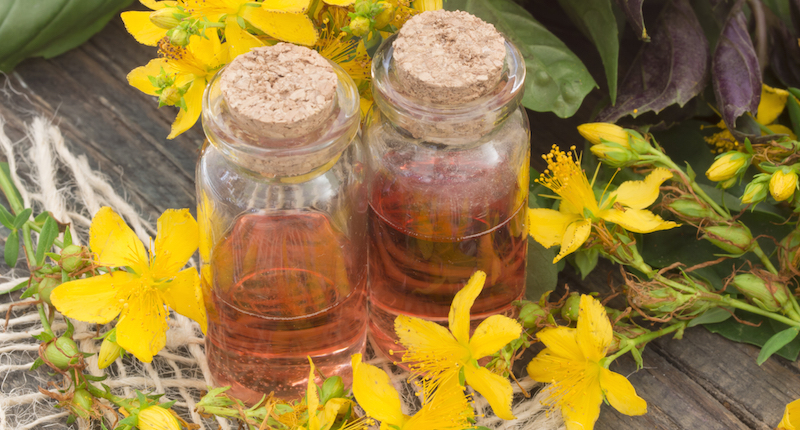St. John’s Wort Oil: The Magic Ointment That Heals Skin, Sore Muscles And Many More!
Last updated on
St. John’s wort, a medicinal plant native to Europe has been used for over 2,000 years for its healing powers.
It is used to treat infected wounds, heal burns, eczema and inflammatory skin diseases; as well as relieve anxiety, depression and insomnia.

St. John’s Wort Plant
Also known as Hypericum Perforatum, St. John’s wort is a herbaceous perennial plant with bright yellow flowers that have oval, elongated petals. It is native to Europe but commonly found in meadows and woods in the United States, Canada and Australia.
It gets its name from St. John (because it flowers around the 24th June, John the Baptist’s birthday), and “wort”, the ancient English word for plant.
In the Middle Ages people used to burn it inside haunted houses to get rid of the devil. Today It is widely used as a traditional remedy to cure skin related problems and anxiety disorders.
Medicinal Uses Of St. John’s Wort Oil
Thanks to its powerful anti-inflammatory and antibacterial properties, St. John’s Wort infused oil is a potent panacea for a multitude of health problems—particularly skin related:
St. John’s Wort oil to treat burns: St. John’s Wort oil soothes the pain caused by burns and accelerates the healing process. This can often prevent blistering of the skin and minimize or eliminate scaring. Soak the affected area with Saint John’s Wort oil and cover to help keep in the moisture.
Sunburn: St. John’s Wort oil can help the skin recover from sunburn. Always apply in the evening. Make sure not to re-expose the skin to the sun as the combination of the oil and the sun may make the burn worse.
Eczema, skin rash, skin irritation: Topical application twice daily helps to alleviate itchiness, redness and dry skin.
Related reading: Use coconut oil to soothe and heal eczema.
Insect bites: it works great on bites and stings! Get rid of the pain, swelling and the burning sensation after a bee or wasp sting by soaking the affected area in the oil or by just applying it. It’s great for relieving itch from mosquito bites too!
Speed up recovery and heal wounds: The oil helps with all kinds of open wounds from scrapes to deep cuts. Applied topically three times a day, it can relieve associated symptoms and speed up recovery.
Muscular and joint pain: Massage St. John’s Wort oil on the affected area to relieve muscle strain and tension.
Bed sores: it helps to heal even the worse bed sores that wont go away.
Herpes manifestations.
Haemorrhoids: Applied topically three times a day, it may relieve associated symptoms.
Psoriasis: Apply the oil twice a day for at least four weeks to relieve the symptoms of Psoriasis and see the skin heal before your eyes!
Arthritis: Saint John’s Wort oil can ease arthritic pain, thanks to its high concentration of antioxidant and anti-inflammatory compounds.
Earache: A few drops of oil can be put into the ear to relieve pain.
Excess wax in the ear channel: Gently warm a few drops of St. John’s Wort oil and drop them in the ear. The excess wax will slowly loosen and come out on its own accord.
Perineal massage: After giving birth, an oil massage can speed up the healing process of the perineal area.
Stretch marks and scars: Applying St. John’s Wort oil regularly on stretch marks and cars will help heal the skin tissues and regenerate new skin.
Fungal infections: Use St. John’s Worth oil topically to stop fungal infections.
Stomach ulcers: Taken orally, the oil infusion can help with stomach ulcers and gastritis.
Cosmetic use: St. John’s Wort nourishes the skin. Apply a little on the face and neck for a wonderful anti-aging effect.
Beneficial Chemical Compounds Found in St John’s Wort
St. John’s wort contains the following components that have proven medicinal values, such as:
- Hyperforin—thanks to its antibacterial properties against Gram-positive bacteria and anti-inflammatory effects, it is believed to be useful in the treatment of infected wounds and inflammatory skin diseases
- Hypericin has an antibiotic and antiviral properties
- Flavonoids (rutin, quercetin and kaempferol).
- Phenolic acids
- Tannins
- Essential oils
DIY: How to Make Your Own St John’s Wort Oil
Making your own Hypericum oil is very easy and good fun too!
The best time to find this flower is towards the end of June in the Northern Hemisphere (early summer). Make sure you are picking the right plant, that is Hypericum Perforatum that grows wild, and not the ornamental plants of the Hypericum family, that are grown in gardens for landscaping.
Here’s what you need
- 1 clean glass jar (transparent)
- 250g extra virgin olive oil, organic and cold pressed
- 150g freshly picked St John’s Wort flowers. You can also use the leaves, but aim for a high concentration of flowers for a more powerful ointment.
Important Note: When harvesting, try to find the flowers growing in a natural environment such as in a meadow or woodland, away from roads and cultivated fields using pesticides.
Preparation
- After harvesting the flowering tops, first let them wilt for a few hours to get rid of insects and humidity.
- Place the flowers in the glass jar with the olive oil. Squashing down if necessary to ensure that they are completely submerged in the oil.
- Put the lid on and leave the jar in the sun for 3 weeks, turning upside-down every few days to ensure a good mixing and distribution.
Hint: You will soon notice that the infusion of the flowers will turn your oil red. - After three weeks your oil is ready to be sieved. Discard the flowers and pour the herbal-infused oil into a clean glass bottle ready for use.
If you don’t want to make your own, you can easily find St John’s Wort Oil at your drugstore or buy it online here (but you miss out on the fun part!).
Extracts and Tincture:
Other Beneficial Uses Of St. John’s Wort
Hypericum Perforatum flower is also used in extracts and tinctures (not the oil).
It can be used as an internal remedy to help minor depressive disorders, anxiety, stress, headache, tiredness, loss of appetite, insomnia and moodiness. It is often prescribed to children and teenagers thanks to minor side effects compared to other antidepressants.
This is why it is also called the “trauma oil”.
Recent studies have proven that Hypericum Perforatum intake may help:
- Premenstrual syndrome (PMS): It can alleviate symptoms of PMS in some women, like cramps, irritability, breast tenderness.
- Seasonal affective disorder (SAD): It helps states of light depression due to the lack of sunlight in winter.
- Menopause: It can improve mood and menopausal complaints.
- Obsessive compulsive disorder (OCD): According to a clinical study, St John’s Wort may have positive effects on treating this mental disorder.
FAQ
What are the side effects of Saint John’s Wort oil?
Is it safe to use Saint John’s Wort oil on children and pregnant woman?
Can I use dried flowers instead of fresh ones to make the oil?
How long does the oil take to change color?
How long does St. John’s Wort oil last for?
Where can I buy Hypericum oil?
You can buy St John’s Wort online, in drugstore and natural shops.
Some of the links I post on this site are affiliate links. If you go through them to make a purchase, I will earn a small commission (at no additional cost to you). However, note that I’m recommending these products because of their quality and that I have good experience using them, not because of the commission to be made.
Comments
Leave a Reply

































 JOIN OVER
JOIN OVER
Can you use it topically if you take Paxil and BusPar?